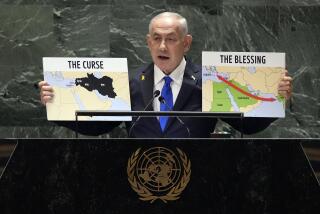Bush Veers From Unilateral Course With Appeal to U.N.
- Share via
UNITED NATIONS — For most of his presidency, George W. Bush has often been willing to go it alone on global issues, earning a reputation even among allies as something of a diplomatic cowboy.
But at the United Nations on Thursday, the president reversed course, tactically at least. He reached out to the world and encouraged the Security Council to play a central role in confronting Iraqi President Saddam Hussein over a decade of defiance--not only on weapons of mass destruction.
The overture shifted the parameters of the Iraq debate in process and substance: Until now, the president has borne the burden of justifying military action against the Iraqi dictator. Now, the onus is shifting to other U.N. members to defend their failure to force Hussein to comply with a host of existing Security Council resolutions.
The issue is no longer only Iraq’s future, Bush asserted, but the future of the most powerful global institution.
“All the world now faces a test and the United Nations a difficult and defining moment,” he told the General Assembly opening session. “Are Security Council resolutions to be honored and enforced or cast aside without consequence? Will the United Nations serve the purpose of its founding or will it be irrelevant?” The new U.S. approach also increases the pressure on Hussein by expanding the focus from disarmament to several broad areas of violations by Baghdad. The agenda now includes everything from Iraq’s repressive political system to its gross human rights abuses, from its oil smuggling operations in violation of U.N. economic sanctions to its failure to return people from 10 nations, including one U.S. pilot, unaccounted for since the 1991 Persian Gulf War.
“By citing a litany of all resolutions that Iraq had violated, he raised the bar considerably--both for the United Nations and Iraq,” said Henri J. Barkey, a former State Department Iraq expert and now chairman of the international relations department at Lehigh University.
“He made it harder for the United Nations not to act and almost impossible for Saddam Hussein to comply. He really upped the ante.”
Bush’s decision--based on advice from Secretary of State Colin L. Powell and others in the administration about the perils of taking on Hussein alone--reshaped the debate over Iraq. And judging from the first reactions, he made some headway both at home and abroad.
Among key Muslim countries, senior officials attending the U.N. session expressed relief at the speech and the signs that Washington is willing to consult before taking action.
Other allies noted that Bush did not mention “regime change,” the administration’s term for overthrowing Hussein, but instead called for “liberty for the Iraqi people,” a goal more salable for European and Islamic governments.
“We’re still in a wait-and-see mode, but he talked about many of the issues we care about. It could have been much worse,” said a senior official from a Middle Eastern country deeply involved in the Iraq issue that had opposed U.S. military action.
At home, Democratic critics found much to praise. “The man did a brilliant job today,” said an effusive Sen. Joseph R. Biden Jr. (D-Del.), chairman of the Foreign Relations Committee.
“It represents a significant shift by the administration,” added Lee H. Hamilton, a former chairman of the House International Relations Committee who now heads the Woodrow Wilson International Center, a Washington think tank. “In August, Vice President Cheney seemed to be rejecting diplomacy and declaring full speed ahead toward war. Now there’s been a step back from war, and a step toward diplomacy.”
As if to prove the good U.S. intentions, the president announced that the United States will rejoin a popular U.N. organization it withdrew from in 1984, during the Reagan administration, charging mismanagement and politicization. Bush said Washington will now “participate fully” in UNESCO--a move that scored points in the General Assembly.
Yet the president’s newfound regard for the U.N. may prove to be more of a short-term gambit than a fundamental conversion. Bush warned that if the U.N. fails to act against Iraq, the United States still reserves the right to act alone.
“We must stand up for our security and for the permanent rights and hopes of mankind. By heritage and by choice, the United States of America will make that stand,” he said in closing his speech.
Bush also set a deliberately high barrier for Hussein to clear if he hopes to avoid a war. Indeed, asked whether the administration believes Hussein might surprise the world and comply, a senior official replied crisply: “No.”
Thus Bush appears to have accomplished two aims in his first round of autumn diplomacy on Iraq.
In the short run, officials and scholars said, Bush appears likely to achieve his goal of a new Security Council resolution demanding that Hussein admit U.N. weapons inspectors to Iraq with no restrictions on their movements. Washington now hopes that the next two stages--a new U.N. resolution and the dispatch of weapons inspectors--will be complete within the next six weeks, according to State Department officials.
But if Hussein refuses to admit the inspectors, or admits the inspectors but refuses them free access to top-secret weapons facilities, the crisis may come abruptly to a head, setting up a confrontation with the United Nations.
“He’s going to deny, delay, challenge the mission, challenge the composition of the [inspection] team,” said Judith Yaphe, an Iraq expert at National Defense University in Washington.
“I don’t see them letting someone in. If they did, they would minimize their capacity to go anywhere. And when they do that, you have your breach of compliance--your casus belli that justifies military action.”
And at that point, U.S. officials hope, international support for military action against Iraq will be considerably greater than today.
More to Read
Sign up for Essential California
The most important California stories and recommendations in your inbox every morning.
You may occasionally receive promotional content from the Los Angeles Times.











